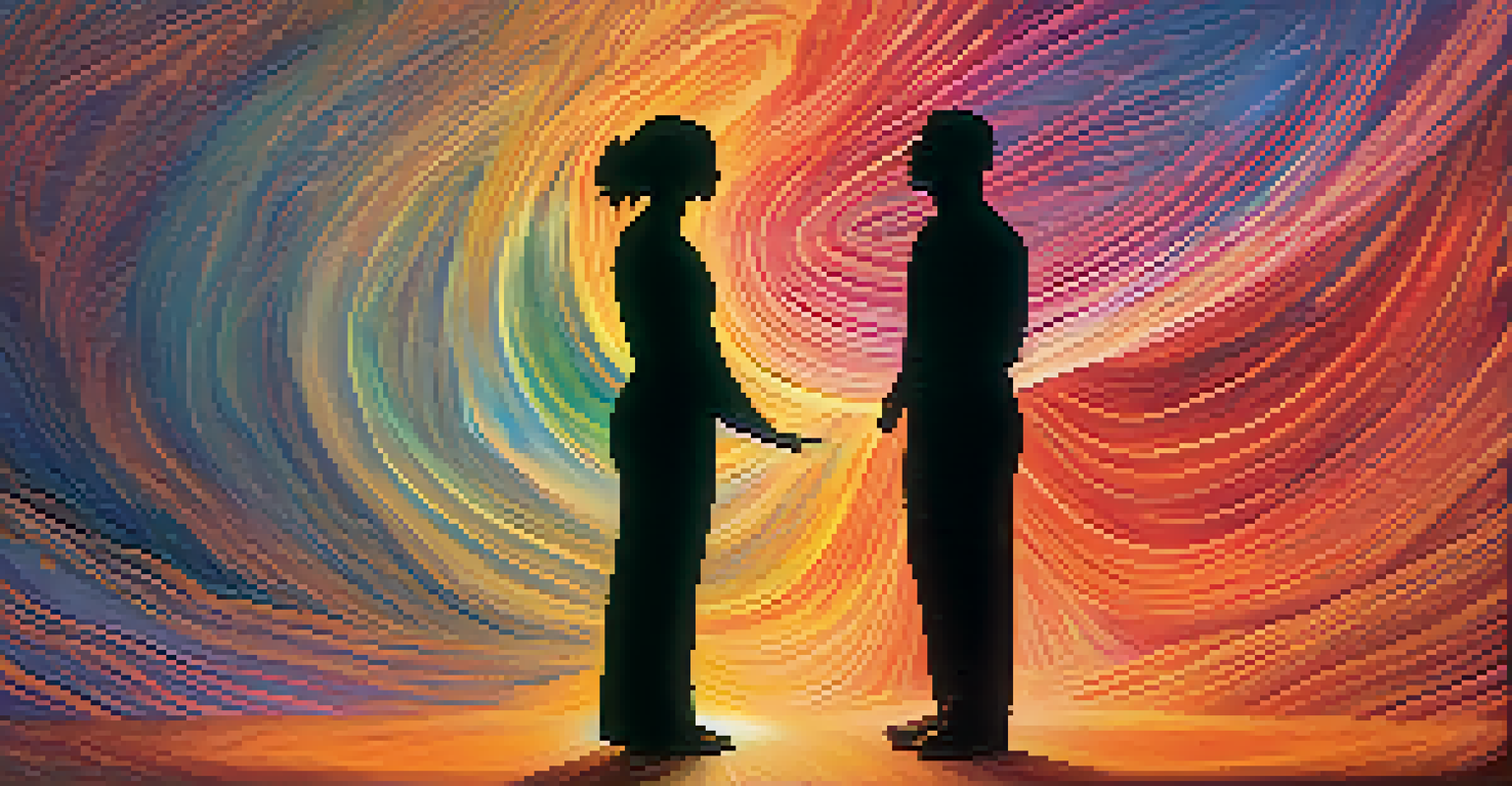The Science Behind Hallucinogens and Empathic Responses

Understanding Hallucinogens: A Brief Overview
Hallucinogens are substances that alter perception, mood, and cognitive processes. These compounds can be found in nature, like psilocybin mushrooms and peyote, or synthesized in a lab. When ingested, they affect the brain's serotonin receptors, leading to profound changes in behavior and perspective.
The mind is everything. What you think you become.
The experience of hallucinogens often involves vivid sensory distortions and emotional shifts. Many users report feeling a deeper connection to the world around them, which can enhance feelings of empathy and compassion. This transformative experience has sparked interest in their therapeutic potential.
While hallucinogens have been used in various cultural rituals for centuries, modern research is catching up. Scientists are now investigating their applications in treating conditions like PTSD and depression, suggesting these substances might help people connect with their emotions in ways they previously couldn't.
The Brain on Hallucinogens: A Chemical Symphony
When we consume hallucinogens, our brain undergoes a unique chemical transformation. The primary player in this process is serotonin, a neurotransmitter that regulates mood and perception. Hallucinogens mimic serotonin, binding to its receptors and altering the brain's communication pathways.

This shift can lead to enhanced sensory experiences, where colors appear more vibrant and sounds become more profound. For many, this heightened experience fosters a sense of unity with their surroundings, blurring the lines between self and other. It's as if the brain is tuning into a different frequency of reality.
Hallucinogens Enhance Empathy
Users often report heightened empathy and emotional connectivity during hallucinogenic experiences, potentially leading to personal growth.
Moreover, imaging studies show that areas of the brain linked to self-identity become less active during these experiences. This reduction in ego-driven thought may allow individuals to connect more deeply with others, fostering empathic responses that can feel both exhilarating and enlightening.
Empathy: The Heart of Human Connection
Empathy is our ability to understand and share the feelings of others, a crucial element in forming meaningful relationships. It allows us to step into someone else's shoes and experience their emotions, creating a bond that strengthens our social fabric. But what happens to our empathy when we introduce hallucinogens into the equation?
Psychedelics can help us understand the nature of consciousness, and how it relates to the universe around us.
Many users report heightened empathy during their hallucinogenic experiences, often mentioning a profound sense of connection to others. This could be tied to the brain's altered state, which allows for a broader emotional understanding. Imagine feeling as though you can truly feel another person's joy or pain, almost as if their emotions were your own.
This increase in empathic response has led researchers to explore how hallucinogens might enhance emotional intelligence. By fostering a deeper understanding of ourselves and others, these substances hold potential for personal growth and healing, both for individuals and communities.
Therapeutic Uses: Hallucinogens in Mental Health Care
The therapeutic potential of hallucinogens has gained momentum in recent years, especially in treating mental health disorders. Studies have shown promising results in using substances like psilocybin and MDMA for conditions such as depression, anxiety, and PTSD. These treatments often incorporate guided sessions where patients explore their emotions with the aid of a therapist.
During these sessions, the heightened sense of empathy can help patients confront painful memories and emotions. By connecting deeply with their feelings and those of others, individuals can find new perspectives on their trauma, leading to healing and resolution. It's a bit like peeling back layers of an onion to reveal the core, allowing for profound change.
Therapeutic Potential in Mental Health
Research shows hallucinogens like psilocybin and MDMA may effectively treat mental health disorders such as PTSD and depression.
As research continues, the integration of hallucinogens into therapeutic practices could revolutionize mental health care. With the right support and guidance, these substances might offer transformative experiences that promote healing and emotional resilience.
Safety and Risks: Approaching Hallucinogens Responsibly
While the allure of hallucinogens can be strong, it's essential to approach them with caution. Not everyone will have a positive experience; some may encounter anxiety or paranoia during their trip. Understanding the setting and mindset before usage is crucial, as they can significantly impact the experience.
Moreover, individuals with a history of mental health issues should exercise particular caution. Hallucinogens can exacerbate underlying conditions or trigger adverse reactions. It's always wise to consult with a healthcare provider before considering any form of psychedelic therapy.
Safety measures, such as having a trusted guide or therapist present, can help mitigate risks. By ensuring a supportive environment, users can navigate their experiences more safely, leading to insights that foster personal growth and empathy.
Cultural Perspectives: Hallucinogens in Society
Hallucinogens have been a part of various cultures for centuries, often used in spiritual or healing practices. Indigenous communities have long recognized the potential of these substances to connect with the divine and promote communal bonding. Their use is often steeped in tradition, making the experiences deeply meaningful.
In contrast, modern society has had a more complicated relationship with hallucinogens, often viewing them through a lens of stigma and legal restriction. However, as research uncovers their benefits, there's a growing movement advocating for a reevaluation of their role in society. It's a fascinating shift that mirrors our changing understanding of mental health and wellness.
Cultural and Historical Significance
Hallucinogens have been integral to various cultures for centuries, often used in spiritual practices and communal bonding.
This cultural renaissance around hallucinogens emphasizes the importance of context and intention. As we explore their potential, it's crucial to honor the traditions that have long revered these substances while also paving the way for responsible and informed use in contemporary settings.
Future Directions: Hallucinogens and Empathy Research
As interest in hallucinogens grows, so does the research into their effects on empathy and emotional well-being. Scientists are embarking on studies to better understand how these substances influence our ability to connect with others. The findings could reshape the way we think about mental health treatments and human relationships.
Future research may delve deeper into the neurobiological mechanisms behind the empathic responses triggered by hallucinogens. Understanding these processes could lead to new therapeutic approaches that harness the power of empathy for healing. Imagine a world where empathy is not just a feeling but a tool for personal and societal transformation.

Ultimately, the future of hallucinogens in research and therapy holds great promise. By continuing to explore their effects and potential benefits, we can unlock new pathways toward understanding ourselves and each other, fostering a more compassionate world.